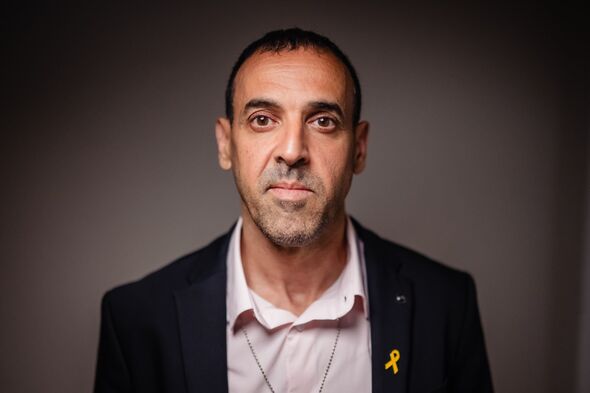World
Survivor Eli Sharabi Reflects on Two Years Since Kidnapping

The traumatic events of October 7, 2023, profoundly marked the life of Eli Sharabi, who was kidnapped by Hamas terrorists while living in his kibbutz near Israel’s southern border. On the second anniversary of the attacks, he opens up about his harrowing experience, revealing the pain of losing his family and the struggle for survival during 491 days in captivity.
During an exclusive interview with the Daily Express, Sharabi recalls the moment masked attackers stormed Kibbutz Be’eri, armed with Kalashnikov rifles. “I will never forget the look of terror in their eyes,” he said, referring to his British wife, Lianne, and their daughters, Noiya, 16, and Yahel, 13. Tragically, all three were murdered shortly after his abduction, their British passports offering no protection against the violence of that day.
Sharabi was among approximately 250 Israelis taken across the border into Gaza on that fateful day. As he was forcibly driven away, he prayed fervently to avoid being buried underground. “Just not a tunnel, please, God, not a tunnel,” he recalled during a recent Zoom call. “Not the nightmare of being buried underground, a bottomless underworld with no light, no air, and no return.”
The aftermath of the kidnapping revealed the devastating toll of violence on families. By the time of his release on February 8, 2024, Sharabi had lost not only his wife and daughters but also his brother, Yossi, who was killed after 100 days in captivity. He learned of their deaths only after reuniting with surviving family members. “I had hoped they had survived, but deep down, I knew there was a strong possibility they had been murdered,” he shared.
Sharabi’s physical condition upon his release was alarming. Weighing less than 45 kilograms, he had endured starvation, beatings, and extreme confinement. He described the emotional toll of writing his book, Hostage, as both painful and therapeutic. “It represents an important part of my country’s history, and I am a small part of that now,” he stated, emphasizing the significance of his story.
Despite the physical scars, Sharabi is committed to rebuilding his life. He recently returned to his former home, a site of personal tragedy, but felt unable to enter. “Not just yet,” he remarked, acknowledging the need for more time to heal. Presently, he is focused on advocating for the remaining 48 hostages still held by Hamas, determined to keep their plight in the public eye.
Sharabi’s journey has been supported by a network of family and friends who provide him with strength. “I am surrounded by family and friends at all times. I am never alone,” he explained. Next week, he plans to move into his own apartment, marking another step in his recovery. “I have to start my life again. I am so lucky to be alive and to be a free man. Freedom is priceless,” he emphasized.
Throughout his captivity, Sharabi was held with various hostages, including Ori Danino, Almog Sarusi, and Hersh Goldberg-Polin, all of whom were ultimately killed. He spent much of his time with Alon Ohel, a musician who remains missing. “I did my best to look after him because you cannot expect the younger ones who didn’t have my life experience to cope alone,” Sharabi recalled. The hostages formed a bond, praying together and performing Jewish rituals for comfort and strength.
Surviving on meager rations, Sharabi described the hunger as a constant struggle. During the last six months, he often subsisted on just half a pitta or a small bowl of pasta each day. “The hunger turns each man inward. Empathy dries up,” he reflected, highlighting the psychological toll of deprivation. To compound their suffering, the hostages were subjected to humiliating conditions, including shared bathroom facilities and a lack of basic hygiene.
Sharabi’s background is rooted in his connection to Israel. Born in Tel Aviv-Yafo, he moved to Kibbutz Be’eri at the age of 14. He met Lianne, a British volunteer, in April 1995, and they married in the UK. After his release, he reached out to Lianne’s parents, who had shared Christmases with him in Bristol prior to the attacks. “It was so hard talking to them,” he noted, reflecting on the enduring bonds of family amidst loss.
As he works to raise awareness about the remaining hostages, Sharabi senses a collective fatigue among Israelis regarding the ongoing conflict. “Most I speak to have had enough,” he remarked. Looking ahead, he aspires to become a private mathematics tutor for young people, channeling his experiences into a positive future. “I choose to move on and be positive, I choose light,” he affirmed.
His memoir, Hostage by Eli Sharabi, is now available through Swift Press for £18.99, providing readers with a profound insight into his ordeal and resilience in the face of unimaginable adversity.
-

 Business5 months ago
Business5 months agoKenvue Dismisses CEO Thibaut Mongon as Strategic Review Advances
-

 Lifestyle4 months ago
Lifestyle4 months agoHumanism Camp Engages 250 Youths in Summer Fest 2025
-

 Sports4 months ago
Sports4 months agoDe Minaur Triumphs at Washington Open After Thrilling Comeback
-

 Sports5 months ago
Sports5 months agoTupou and Daugunu Join First Nations Squad for Lions Clash
-

 Top Stories5 months ago
Top Stories5 months agoColombian Senator Miguel Uribe Shows Signs of Recovery After Attack
-

 World5 months ago
World5 months agoASEAN Gears Up for Historic Joint Meeting of Foreign and Economic Ministers
-

 Health4 months ago
Health4 months agoNew Study Challenges Assumptions About Aging and Inflammation
-

 Business5 months ago
Business5 months agoOil Prices Surge Following New EU Sanctions on Russia
-

 Entertainment4 months ago
Entertainment4 months agoDetaşe-Sabah Violin Ensemble Captivates at Gabala Music Festival
-

 Entertainment4 months ago
Entertainment4 months agoBaku Metro Extends Hours for Justin Timberlake Concert
-

 Top Stories5 months ago
Top Stories5 months agoRethinking Singapore’s F&B Regulations Amid Business Closures
-

 Business5 months ago
Business5 months agoU.S. House Approves Stablecoin Bill, Sends to Trump for Signature









